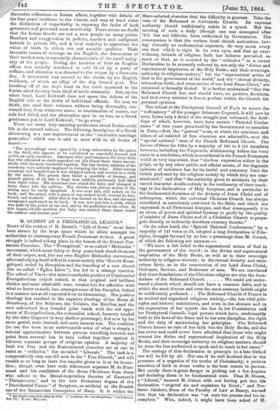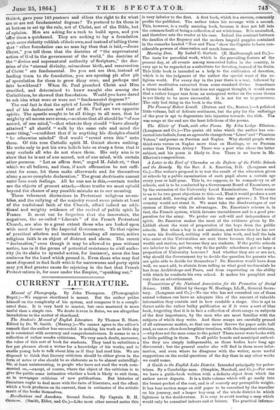M. GUIZOT AS A THEOLOGICAL LEADER.* MANY of the readers
of M. Renan's " Life of Jesus " must have been struck by the large space which he allots amongst his authorities to contemporary French Protestant writers. A great struggle is indeed taking place in the bosom of the French Pro- testant Churches. The "Evangelical," or so-called " Methodist " movement, which some thirty or forty years back shook them out of their torpor, and, like our own English Methodist movement, after embodying itself at first in a mere society (the "Societe Evan- gelique) ended by disruption and the founding of a new church (the so-called " Eglise Libre "), has led to a strange reaction. The school of Vinet—the most remarkable product of Continental Evangelicalism (which indeed, in that original and brilliant thinker and most admirable man, retains but few affinities with what we know as such) has, amongst some of his disciples, fruited in a manner not at all expected from its blossoming. His positive theology has resulted in the negative theology of time Revue de Strasbourg, of the Scherers, the Colanis, the Revilles, and the new sub-school thus founded joins hands with the old oppo- nents of Evangelicalism, the rationalist school, formerly headed by the elder Coquerel (a very shallow personage), but now by his more genial, more learned, and more earnest son. The coalition (to use the term in no unfavourable sense of what is simply a natural approximation between persons travelling towards one point from several) has in turn rallied together against it hitherto separate groups of religious opinion. A majority of both time Free and the State-salaried churches are at one to resist as " orthodox " the so-called " Liberals." The task is a comparatively easy one till now in the " Free Church," and will remain so as long as lasts the impulse given to it at its forma- tion ; though even here wide differences separate M. de Pres- sense and his coadjutors of the Revue Chritienne from those who adhere to the literal-inspiration theories of Gaussen's " Theopneustie," and to the new Protestant dogma of the " Providential Canon " of Scripture, as artificial as the Romish one of the Immaculate Conception of Mary. It is within the
• Les colovraues Postvrales de 1864. ("Archives du Christianisme," Third Series. Vol VI.) Paris Meyruefe. State-salaried churches that the difficulty is greatest. Take the case of the Reformed or Calvinistic Church. Its supreme authority should traditionally reside in a synod. But the, meeting of such a body (though one was attempted after '48) has not hitherto been authorized by Government. The- consequence is that the various local church authorities, hav- ing virtually no ecclesiastical superiors, do very much every one that which is right in its own eyes, and that an ever- widening latitude of religious faith has hitherto prevailed, so- much so that, as is asserted by the " orthodox" in a recent. Declaration to be presently referred to, not only the "divine and supernatural inspiration of the Holy Books, and their sovereign. authority in religions matters," but the "supernatural action of- God in the government of the world," and the " eternal divinity,. miraculous birth, and resurrection of our Lord Jesus Christ," are contested or formally denied. It is further maintained "that the- Reformed Church has, and should have, no positive doctrines, and that every minister is free to profess within the Church his personal opinions.
The refusal of the Presbyteral Council of Paris to renew the " suffraganey " of the younger Athanase Coquerel, it will now be seen, forms only a detail of the struggle just indicated, the field- days of which, however, have been certain "Pastoral Confer- ences" of late years permitted by the Government to assemble in Paris,—first the " general " ones, to which the ministers and elders of all salaried or free churches are admissible, next the " spacial national " ones of the French Reformed Church. The former of these for 1864, by a majority of 160 to 6 (12 members- however, including the Coquerels, withdrawing before the vote). came to a resolution, which is considered in the French Protestant world as very important, that " the free expression either in the pulpit, or by any other public and official means, of the dogmatic- opinions of ministers has for its lawful and necessary limit the- beliefs professed by the religious society by which they are com- missioned ;" and that " the authority given to ministers by their- sacred character dwells entirely in the conformity of their teach- ings to the declarations of Holy Scripture, and in particular to• the fundamental doctrines of the divinity of Jesus Christ and of redemption, which the universal Christian Church has always considered as notoriously contained in the Bible, and which are- expressed in all Protestant liturgies, and that consequently it is- an abuse of power and spiritual tyranny to profit by the quality of minister of Jesus Christ and of a Christian Church to propa- gate directly or indirectly doctrines contrary thereto."
On the other hand, the " Special National Conferences," by a majority of 141 votes to 23, adopted a long Declaration of Prin- ciples, brought forward by no less a personage than M. Guizot, of which the following are extracts :-
" We have a full belief in the supernatural action of God in the government of the world ; in the divine and supernatural inspiration of the Holy Books, as well as in their sovereign authority in religious matters ; in the eternal divinity and mira- culous birth, as in the resurrection of our Lord Jesus Christ, God-man, Saviour, and Redeemer of men. We are convinced that these foundations of the Christian religion are also the foun-
dations of the Reformed Church We could not under- stand a church which should not have a common faith, and in which the most diverse and even the most contrary beliefs might be indifferently professed. . . The Reformed Church of France is an ancient and organized religious society,—she has vital prin- ciples and historic institutions, and even in the absence and in the expectation of her synods she has in her Conaistories and her Presbyteral Councils legal powers which have, conformably both to the laws of the State and to her own discipline, time right and the duty of maintaining her principles. The Reformed Church knows no rule of her faith but the Holy Books, and she has never and could never have admitted that those who might. contest the divine and supernatural inspiration of the Holy Books, and their sovereign authority on religious matters, should be none the less authorized to speak and to teach in her name."
The analogy of this declaration in principle to a late Oxford one will be felt by all. Nor can it be well doubted that in the presence of a negation of the truths of Christianity, a positive assertion of faith in those truths is the best course to pursue. But surely there is great danger in picking out a few dogmas and declaring them to be fundamental ones. Thus M. Douen, a "Liberal," taunted M. Guizot with not having put into his deolaratiou " original sin and expiation by blood ; " and Pro- fessor Jalabert, Dean of the Faculty of Law at Nancy, warned him that his declaration was " at once too precise and too in- complete." Who, indeed, it might have been asked of M. Guizot, gave your 143 pasteurs and elders the right to fix what are or are not fundamental dogmas? To pretend to fix them is at bottom to set up the rule, not of Christ, not of the Bible, but of opinion. Men are asking for a rock to build upon, and you 'offer them a quicksand. They are seeking to lay a foundation with some ricketty rubbish of their own, and instead of telling them that " other foundation can no man lay than that is laid,—Jesus Christ," you tell them that the doctrine of "the supernatural action of God in the government of the world," the doctrine of the " divine and supernatural authority of Scripture," the doc- trine of the "eternal divinity, miraculous birth, and resurrection of Christ" are fundamental. Do you not see that, instead of leading them to the foundation, you are opening pit after pit of speculation for them to grow dizzy over, and perhaps reel into bewildered? When St. Paul preached Christ and Him crucified, and determined to know naught else among the Corinthians, he showed that foundation. Would you have dared to ask him what were or were not " fundamental dogmas ?"
The real fact is that the spirit of Louis Philippe's ex-minister and of his declaration and that of St. Paul are two opposite spirits. The apostle sought to be all things to all men, that be might by all means save some,—anxious that all should be "of one accord, of one mind,"—that whereto they should " have already attained" all should " walk by the same rule and mind the same thing,"—confident that if in anything his disciples should " be otherwise minded" God would " reveal even this" unto them. Of this true Catholic spirit M. Guizot shows nothing. He seeks only to put his own beliefs into so sharp a form that it may exclude all who do not share them. His only aim is to show that he is not of one accord, not of one mind, with certain other persons. "Let us affirm first," urged M. Jalab2rt, " that which we all believe, and then, if such affirmation be not suffi- cient for some, let them make afterwards and for themselves alone a more complete declaration." The great doctrinaire cannot enter into such feelings. All he can see is this,—certain truths are the objects of present attack,—those truths we must uphold beyond the chance of any possible mistake as to our meaning.
These vehement discussions in Protestant religious assem- blies, and the rallying of the majority round some points at least of the traditional faith of the Church, afford indeed an addi- tional and weighty evidence of the revival of public spirit In France. It must not be forgotten that the innovators, the negatives, the so-called "Liberals" of the French Protestant Church, are also to a great extent those who are looked upon with most favour by the Imperial Government. To that regime of practical atheism and incarnate humbug all earnest, active religious faith is an object of distrust and alarm. The recent 4, declaration," even though it may be allowed to pass without notice, has in it the germs of potential resistance to civil autho- rity (in its claim to synodal'action, for instance), none the less ominous for the hand which penned it. Even those who may feel most disposed to find fault with it for narrowness and party spirit may yet find greater cause for rejoicing in the fact that French Protestuttism is, for once under the Empire, "speaking out."































 Previous page
Previous page